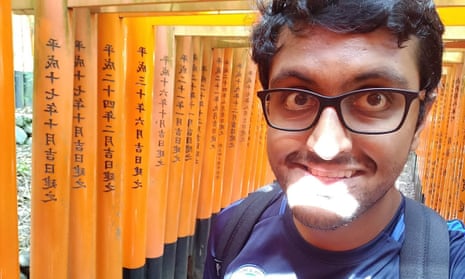Mahesh Makani is a software developer who humorously calls himself a “person who can do code everywhere.” He started coding when he was in sixth form at Woodhouse College in Barnet north London, and went on to study physics at the University of Sussex in Brighton, before working as a developer.
What led you to software development?
At university there were a lot of things in my physics degree around programming that I quite enjoyed. I eventually became self-taught in the area – learning some JavaScript in two days – and went on to get my first job as a web developer.
What does a typical day look like for you at the Guardian?
I live in a village called Cuffley in Hertfordshire and before the pandemic and remote working, I commuted by train to the Guardian offices in Kings Cross in London. I could go from home to the office door in an hour. Now I wake up in the morning and I’m ready to go. I get my cup of coffee, and then – this is going to sound incredibly boring – I check my emails to make sure nothing has broken overnight! What comes after that can vary. There can either be work to continue from the day before or it could be straight to a daily standup meeting, where we get to speak to everyone in the team.
How would you describe the office atmosphere – and what has been different about working remotely since the start of the coronavirus pandemic?
If I had one word to describe the atmosphere at the office it would be “warm”, and that’s not just because the AC breaks down every now and again (or so I’ve heard). Another word is “relaxed”. There is a casual dress code – work is about your abilities and not the way you look. Things of course are more challenging with everyone being fully remote and there is a lot to miss about being all together under one roof. Standups are actually more important now than they were before - it’s just really good to see familiar faces! They let you know what everyone is up to and you can ask if you need help with anything.
Quick GuideHow do I join The Guardian Product & Engineering?
Show
Where can I find open positions?
Apply for one of our open positions here.
What can I expect from the interview process?
We aim to be as fair and transparent as possible in our hiring process. Similar to other organisations, there is a CV screening, coding exercise and a face to face interview. Read more about what to expect and apply now here, and read more about our department here.
What work do you enjoy most?
Pairing work is really interesting. This usually involves working with another developer, who may be on a different team – so someone who you wouldn’t normally interact with. It’s meant to be very collaborative, as it involves a lot of communication.
It takes longer to deliver code compared to working individually, but the code is generally of a higher quality as you’ve been able to share ideas. This also means that it can be an effective way to distribute knowledge between developers, especially if the person you’re pairing with is more specialist in certain areas. And there’s the social aspect – by collaborating with someone, you get to know them better as a person too.
Working on the sorts of projects we do, there is always collaboration in some form, whether with a direct member of your team or cross-functionally. This means that ultimately the days and the work will never get boring.
From a developer’s point of view, one of the best things about the Guardian is also the fact that all the code is open source. The transparency in that regard is quite rare and admirable.
Beside this, I like what the Guardian does – I like the values we uphold as a news organisation, and I was confident I would be working with like-minded individuals. Everyone is really friendly, warm and supportive.
What are you currently working on?
I am currently working on a project that involves migrating the frontend of the Guardian website to a new and improved platform. The shift should allow developers to continuously apply updates, as well as offer users a superior experience.
When did you join the Guardian?
I happened upon the engineering blog on the Guardian website when I was a developer at Net Natives, a student marketing agency. I was looking for a solution to a problem I was working on. While I was browsing, I saw that the Guardian had a short blog series on applying to the Guardian’s digital department and thought this sounded interesting and that maybe I should apply!
Are there any challenges that you have faced in your work?
The main language we use at the Guardian is Scala. I did not know any Scala before I started. I was on the JavaScript bandwagon, so working and learning a new language has been my biggest challenge. But this is another great thing about the Guardian. Even if you don’t know the coding language, so long as you are willing to learn then it’s fine. I can always rely on my teammates for advice on how to approach a problem.
Development of digital products is central to the Guardian. You could be building the products that showcase our progressive and independent journalism, crafting the tools that journalists use to write their stories, developing the services that allow those stories to be distributed across the globe, or safeguarding our financial future.
If you’re interested in joining our product and engineering team, please visit the Guardian News & Media careers page.
